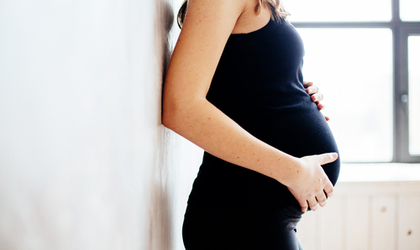
Aside from choosing the colour palette for the nursery and signing up for antenatal classes, you also need to consider your nutrition during pregnancy. Healthy dietary choices won’t just fuel your body as you grow a tiny human for nine months, but they will also give your baby the best start in life.
Unfortunately, the internet is awash with information on what you can and can’t eat. Should you be ‘eating for two’? And what food can you still eat? We’re here to distil fact from fiction.
Choose whole foods
You have a greater need for nutrients during pregnancy to support the development of your growing baby. That’s why it’s crucial to focus on the quality of your diet. Eating a variety of real, whole foods – that is, food in its ‘whole’ form – is central to this.
Load up on fruits, vegetables, legumes (lentils, peas and beans), whole grains (brown rice, quinoa, steel-cut oats, and spelt), nuts, seeds, herbs, and spices. Try to include plant foods with the brightest colours – known as phytonutrients – like carrots, blueberries, and spinach, as they tend to be the most abundant in antioxidants, which help protect you and your baby from free radical damage throughout pregnancy.
Eating a diverse range of foods during pregnancy may also support your little one’s palette as they get older. Research suggests exposure to different foods via the amniotic fluid can influence taste preferences later in life (1). More reason to eat well during pregnancy!
Aside from increasing whole foods, it’s worth reducing your intake of ultra-processed foods (UPFs), which are unusually high in added sugar, salt, and saturated fat. Studies suggest pregnant women with diets rich in UPFs have an increased risk of gestational diabetes and pre-eclampsia (2).
Try to hit every nutritional note
While a balanced, colourful, and whole-food diet will lay the foundation for good prenatal health, there are certain nutrients you need more of in pregnancy, so it’s essential to focus on them, too.
Folate (folic acid)
Folate helps form the neural tube, part of a baby’s nervous system. Although you can find folate in leafy green vegetables, dried beans, citrus fruits, and fortified foods, health officials recommend all women take 400-microgram folic acid (the synthetic version of folate) every day until the 12th week of their pregnancy.
Supplemental folic acid (the synthetic version of folate) may reduce the risk of neural tube defects, like spina bifida, by 92% (3).
Vitamin D3
Vitamin D3 is another important nutrient for pregnancy, helping regulate phosphate and calcium equilibrium, which supports the growth of a baby’s bones, teeth, and nervous system (4).
While you can get small amounts in oily fish, eggs and red meat, sunlight is the best source of vitamin D3. However, it’s not always easy to synthesise enough in the UK, especially between October and March. With this in mind, pregnant women are often advised to take a daily supplement containing 10µg as a maintenance dose.
Iodine
Iodine is essential for producing maternal and foetal thyroid hormones, supporting a baby’s brain and nervous system development (5).
During pregnancy, the recommended daily allowance for iodine increases from 150µg to 250µg. Although there are small amounts in milk, dairy products and fish, it can be challenging to meet this increased nutritional demand from food alone, especially if you’re on a vegan diet. Supplementing with iodine can serve as a useful insurance policy.
H3: Iron
Women also need more iron during pregnancy. This mineral helps transport healthy red blood cells, which carry oxygen around your body to tissues, organs, and, crucially, your baby (6).
Besides upping dietary iron – found in red meat, chicken, eggs, beans, nuts, seeds, and dried fruit – you may want to supplement with iron throughout pregnancy to support your baby’s development and energy levels.
Choline
Emerging research suggests choline may support foetal brain development and prevent common birth defects (7).
Choline is largely found in eggs, meat, and seafood. If your diet doesn’t include these foods, it may be worth taking a supplement to cover any nutritional shortfalls.
Calcium
During pregnancy, calcium supports your baby’s growing teeth, bones, muscles, heart, and nerves. It also keeps your bones and teeth healthy. Without enough calcium in your diet, your baby will leach it from your bones, leaving you prone to osteoporosis (brittle bones).
Increasing dietary calcium from dairy products (milk, yoghurt, and cheese), tofu, almonds, chia seeds, sardines, leafy greens, and lentils is a great place to start. Taking a calcium supplement can also help plug any gaps.
Take a prenatal multivitamin
If you’re looking for a simple, convenient and fuss-free way to cover all of your nutritional bases, it might be worth adding a high-strength, comprehensive pregnancy multivitamin to your regime. Always look for a formula with relevant levels of folic acid, vitamin D3, iodine, iron, choline, and calcium.
You can find out more about what pregnancy vitamins to take here.
H2: Increase omega-3 fatty acids
Getting enough healthy fats is just as important during pregnancy. Omega-3 fatty acids serve as the building blocks of a baby’s brain and retina, supporting memory, vision and language skills (8).
Eating 2-3- portions of oily fish, like salmon, mackerel, and anchovies, weekly is a reliable way to get two of the most critical omega-3s: DHA and EPA. It’s worth mentioning that you should avoid mercury-rich fish during pregnancy since it can harm your baby’s nervous system. With this in mind, steer clear of swordfish, king mackerel, tilefish, and fresh and canned tuna.
If you don’t eat fish, you can also find ALA – a type of omega-3 in plants converted into DHA and EPA in the body – in walnuts, chia seeds, flaxseeds, and hemp seeds. Plant-based microalgae is an excellent source of DHA, too.
Of course, to support your omega-3 intake during pregnancy, you may wish to supplement with a high-strength fish oil or vegan alternative.
Eat complex carbs
Cakes, cookies, and crisps sound deliciously inviting when pregnant and battling cravings. But these highly refined foods spike your blood sugar almost immediately. The variabilities caused by glucose surges not only put you at a greater risk of gestational diabetes, but they can also lead to heavier newborns, who are more likely to be overweight in later life (9).
Where possible, choose complex carbohydrates over their highly processed counterparts. The likes of wholegrain bread, sweet potatoes, wholewheat pasta, brown rice, and nuts break down slowly, meaning they’re less likely to cause a rapid increase in blood sugar levels and further pregnancy complications.
Don’t eat for two
We can see the appeal of ‘eating for two’ during pregnancy. Sadly, this idea is no more than an old wives’ tale. If you’re carrying a single baby, you only need an additional 340 calories per day in your second trimester and 450 calories more in your third.
One study on 8,000 pregnant women reported that 73% had gained more weight than recommended, which can increase the risk of pregnancy complications like high blood pressure (10). Babies with overweight mothers are more likely to be obese later in life, too.
But don’t be too restrictive, either
However, it’s worth mentioning undereating can be just as harmful as overeating during pregnancy. Self-imposed restrictive pregnancy eating patterns can lead to poor health outcomes for mum and baby (11).
Remember, healthy weight gain is normal and important in pregnancy. As long as you’re gaining weight based on your body mass index, you have nothing to worry about.
Don’t ignore food precautions
To protect you and your baby from harmful bacteria, like listeria, salmonella, and E. coli, you need to take care of certain foods.
-
Never eat raw or uncooked meat
-
Avoid pates and meat spread
-
Leave raw seafood and fish off your pregnancy diet plan
-
Avoid raw or uncooked eggs during pregnancy
-
Steer clear of all unpasteurised dairy products, such as Brie and Camembert
-
Avoid raw sprouts, including radish, alfalfa, bean, and clover sprouts
-
Always wash fruits and vegetables
-
Limit your caffeine to 95mg of caffeine daily
Avoid drinking alcohol
It’s worth heeding calls to abstain from alcohol during pregnancy. Drinking throughout pregnancy – especially in the first 12 weeks – has been associated with increased risk of premature birth, low birth weight and miscarriage (12). It can also lead to foetal alcohol syndrome (FAS), which causes severe mental and physical disabilities in babies (13).
As with other countries, including France and the United States, the UK government suggests avoiding alcohol altogether in pregnancy.
Find out more
If you found this article on pregnancy nutrition useful, you can find similar guidance on our health blog. Alternatively, please get in touch with our team of expert Nutrition Advisors, who are on hand to provide free, confidential advice.
References:
-
Mennella J, Jagnow C, Beauchamp G. (2001) Prenatal and Postnatal Flavor Learning by Human Infants. Pediatrics, 107(6), e88-e88.
-
Winter G. (2023) British Journal of Midwifery - Ultraprocessed food and pregnancy. [ONLINE] Available at: https://www.britishjournalofmidwifery.com/content/comment/ultraprocessed-food-and-pregnancy#B7
-
Estevez-Ordonez D, Davis M.C., Hopson B, MSHA, Arynchyna A, Rocque B.G., Fieggen G, Rosseau G, Oakley G, MSPM, Blount J.P.. (2018) Reducing inequities in preventable neural tube defects: the critical and underutilized role of neurosurgical advocacy for folate fortification. Neurosurgical Focus, [online] 45(4), E20.
-
British Journal Of Midwifery. (2020) British Journal Of Midwifery - Importance of vitamin D during the antenatal period for maternal well-being. [online] Available at: https://www.britishjournalofmidwifery.com/content/clinical-practice/importance-of-vitamin-d-during-the-antenatal-period-for-maternal-well-being/
-
De-Regil LM, Harding KB, Peña-Rosas JP, Webster AC. (2015) Iodine supplementation for women during the preconception, pregnancy and postpartum period. Protocol. Cochrane Database of Systematic Reviews. Issue 6. Art. No.: CD011761.
-
Roeren M, Kordowski A, Sina C, Smollich M. (2022) Inadequate Choline Intake in Pregnant Women in Germany. Nutrients. 14(22), 4862.
-
Coletta JM, Bell SJ, Roman AS. (2010) Omega-3 Fatty acids and pregnancy. Reviews in obstetrics & gynecology, 3(4), 163-171.
-
www.urmc.rochester.edu. (n.d.) Large for Gestational Age - Health Encyclopedia - University of Rochester Medical Center. [online] Available at: https://www.urmc.rochester.edu/encyclopedia/content.aspx?ContentTypeID=90&ContentID=P02383#
-
Johnson Julie MD, Clifton Rebecca G. PhD, Roberts James M. MD, Myatt Leslie PhD, Hauth John C. MD, et al. Pregnancy Outcomes With Weight Gain Above or Below the 2009 Institute of Medicine Guidelines. Obstetrics & Gynecology 121(5), 969-975.
-
Dörsam AF, Preißl H, Micali N, Lörcher SB, Zipfel S, Giel KE. (2019) The Impact of Maternal Eating Disorders on Dietary Intake and Eating Patterns during Pregnancy: A Systematic Review. Nutrients. 11(4), 840.
-
RCOG. (2016). Alcohol and pregnancy. RCOG. [online] Available at: https://www.rcog.org.uk/for-the-public/browse-our-patient-information/alcohol-and-pregnancy/.
-
NHS (2017). Foetal Alcohol Spectrum Disorder. [online] nhs.uk. Available at: https://www.nhs.uk/conditions/foetal-alcohol-spectrum-disorder/.
You Might Also Like

Keri
Keri Filtness has worked in the Nutrition Industry for 19 years. She is regularly called upon for her professional comments on health and nutrition related news. Her opinions have been featured by BBC3, Prima, Vitality, The Mirror, Woman’s Own and Cycling Weekly, amongst others. She has also worked one to one with journalists, analysing their diets and health concerns and recommending changes and additions, where appropriate.
View More



